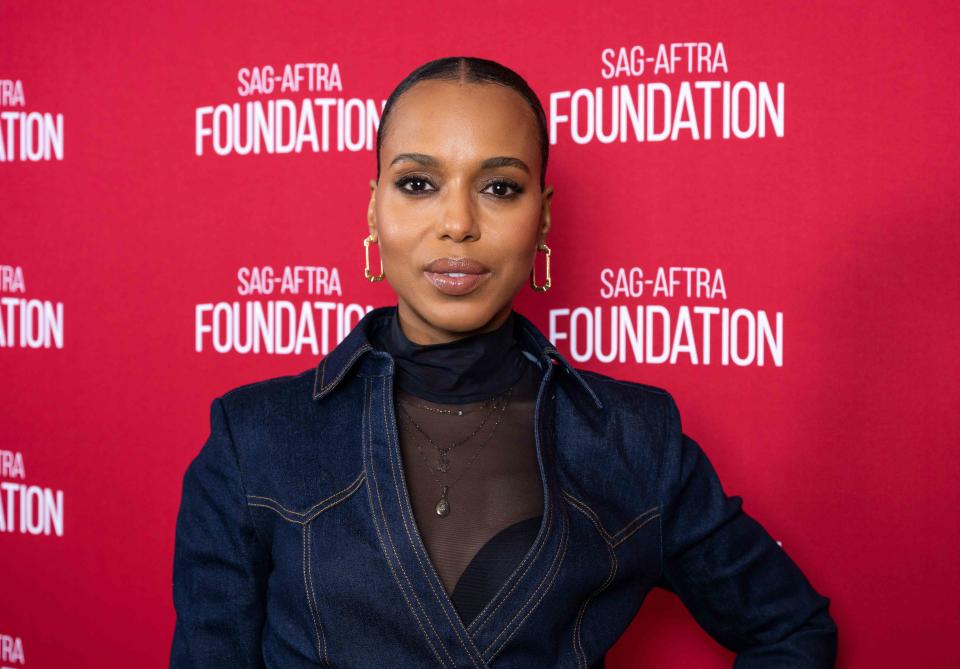Kerry Washington Opened Up About Mental Health Struggles and Battling an Eating Disorder
- Oops!Something went wrong.Please try again later.
- Oops!Something went wrong.Please try again later.
"I've never wanted to share my private life for the sake of fame or for the sake of attention."

Amanda Edwards/Getty Images
Trigger Warning: This article mentions suicidal ideation and disordered eating.
Kerry Washington's memoir, Thicker Than Water, doesn't hit shelves until Sept. 25, but the actress is already giving fans a glimpse into how frank and open she gets in her book. Today, in a new interview with Good Morning America's Robin Roberts, the Scandal star and Emmy winner explained that in the past, she kept many parts of her life private, but she's ready to share her experiences with disordered eating and suicidal ideation.
"I've never wanted to share my private life for the sake of fame or for the sake of attention," she said. "But I feel like this sharing is with purpose."
She went on to say that for her, it wasn't difficult to hide those parts of her life and project a picture-perfect persona for her family, friends, and co-workers. She said that no matter what was going on in her personal life, she was able to get up and perform every single day.
"I was good at performing perfect," she added. "I was good at control. I could party all night and drink and smoke and have sex and still show up the next day and have good grades."
.@kerrywashington opens up to @RobinRoberts about how she says her relationship with food and her body once became a toxic cycle of self-abuse: "I could not control it."
"Kerry Washington: Thicker Than Water" airs Sunday 10/9c on @ABC. https://t.co/bnnOTFBDMf pic.twitter.com/z0CxOXBqKd— Good Morning America (@GMA) September 21, 2023
Related: Kerry Washington Didn't Mean to Change Hollywood, But It Had to Happen
She described just how "high-functioning" she was, going on to explain her experience with body dysmorphia and how much pain she was in.
"I knew how to manage. I was so high-functioning, and the food took me out. Like, the body dysmorphia, the body hatred, it was beyond my control. And really lead me to feeling like I need help from somebody or something bigger than me or I am in trouble," she said. "Because I don't know how to live with this, and I could feel how the abuse was a way to hurt myself as if I didn't want to really be here, and it scared me that I could not want to be here because I was in so much pain."
Later in the chat, when Roberts asked if Washington ever had thoughts of suicidal ideation, Washington replied, "Yeah, the behavior was tiny little acts of trying to destroy myself."
She noted that her experience with disordered eating literally brought her to her knees and that, through prayer and faith, she decided to face the issue.
"The first thing that put me on my knees, the first time that I actually got on my knees and prayed to some power greater than myself to say, 'I can't do this, I need some help' was with my eating disorder," she said.

Nicola Gell/Getty Images for SXSW
Washington finished by saying that now, she has a much better relationship with food and health — she touches on compulsive exercise in her book, as well. Like many people, however, she adds that she still struggles sometimes, though she clarified that it's much better now than it has been.
"I wouldn't say that I never act out with food," she told Roberts. "It's just very different now. It's not to the extreme. There is no suicidal ideation. That's not where I am anymore. The bottom has gotten a lot higher, where just a little discomfort with it is enough for me to know this is a way to check myself. But it definitely looks a lot healthier, it's a lot easier, it's a lot saner than it used to be."
If you're struggling with disordered eating, NEDA has a confidential and toll-free National Eating Disorders helpline.
If a person you love says that they are considering suicide, take them seriously, stay with them in a safe environment, and call the National Suicide Prevention Hotline (1-800-273-8255).
For more InStyle news, make sure to sign up for our newsletter!
Read the original article on InStyle.

